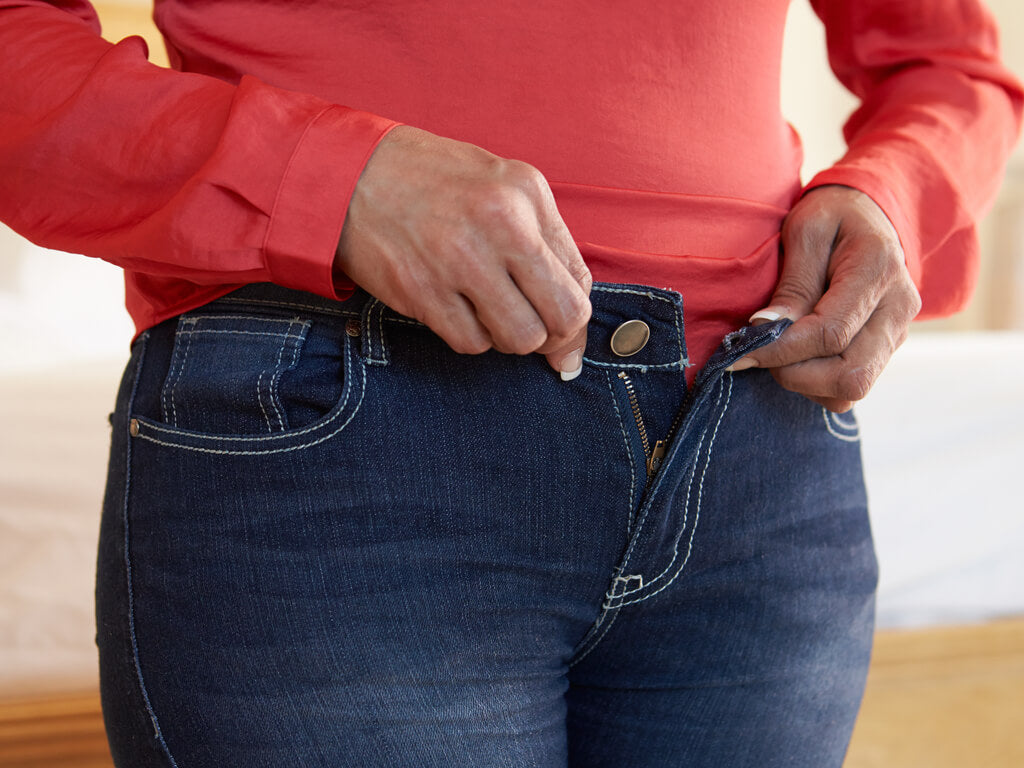Your Cart is Empty
How Long Does Menopause Weight Gain Last?

As you go through menopause, have you found yourself asking questions like “does menopause weight gain go away?” or “how long does menopause weight gain last?” or “Is this just what my body looks like now?”
It’s totally understandable for you to have questions and concerns about menopause weight gain and how long it lasts. You’re on a hormonal rollercoaster right now, and to top it off you’ve got extra weight sitting around your midsection. You have a right to be a bit frustrated!
The good news is that menopause weight gain definitely does not last forever. So, how long does menopause weight gain last? And, is there anything you can do to reverse menopause weight gain? We’ll answer these questions and many more below.
As if the hot flashes, night sweats, brain fog, and menopause fatigue weren’t bad enough, now you’re also dealing with your waist circumference increasing and extra pounds showing up on the scale. Are you frustrated by menopause weight gain? Are you willing to do just about anything to start feeling like your old self again?
It’s easy to think that menopause weight gain will never end. We can assure you, though, that you’re not going to continue putting on weight indefinitely. Read on to learn more about how long menopause weight gain lasts, as well as what you can do to stop and even reverse it.
The Basics of Menopause
First, what is menopause? This is a stage every woman goes through that marks the end of her reproductive years. And unfortunately, it’s accompanied by an array of unpleasant symptoms - menopause belly fat being one of them.
To get an idea of how long weight gain, one of the most common symptoms of menopause, will last, you first need to understand menopause and the typical duration of this period of your life.
On average, the actual stage of menopause only lasts about 12 months. When you have gone 12 full months without menstruating, you’re considered to have gone through menopause and entered postmenopause.
Keep in mind, though, that you can start experiencing symptoms quite a while before you actually cease menstruating. In the years leading up to the cessation of menstruation, your body is going through what’s known as perimenopause.

Perimenopause can last anywhere from two to eight years, although four years is the average length. Most women start going through perimenopause in their late 40s.
During this time, their body begins to produce less and less estrogen. As a result, they start noticing symptoms like hot flashes, changes in their libido, sleeping difficulties, and, of course, weight gain. That being said, how long does menopause weight gain last?
How Long Does Menopause Weight Gain Last?
At this point, you might be thinking something along the lines of, “So, if I’m in perimenopause now, does that mean I’m going to keep gaining weight for the next 2-8 years?!”
Seeing a number like that can be distressing. There’s no need to panic, though.
It’s important to note, first, that most women do not experience a significant amount of weight gain during this period of life. On average, menopausal women gain about five pounds, with only 20 percent of women gaining 10 pounds or more.

Since the amount of weight most women gain is not particularly large, the chance that the number on the scale will continue to rise and your waist circumference will continue to expand for years on end is slim.
Remember, too, that while you might not have control over how long menopause lasts, you can still control your weight gain during this time. You don’t have to passively let your weight increase just because you’re going through significant hormonal changes.
So, how long does menopause weight gain last? As long as you allow it to continue piling up. You don’t have to just hope it goes away fast, you can take action to slim your waistline and trim that fat.
If you’re wondering…what are the signs of coming to the end of menopause? Check out our detailed breakdown on the subject in our blog.
Or, you can take action and start making changes that slow down or even reverse menopause weight gain starting today.
How to Reverse Menopause Weight Gain
If you’re fed up with the weight you’ve already put on and want to stop it in its tracks, there are some effective steps you can take. Here are some effective strategies for stopping menopause weight gain:
Work on Gaining Muscle
At first, the idea of trying to gain anything when you’re already dealing with menopause weight gain might seem preposterous. Remember, though, that gaining muscle can help to speed up your metabolism.

The more muscle you have, the more calories you’ll burn while exercising and when at rest. Start lifting those weights or adding in some bodyweight strength exercises like squats and push-ups!
Adjust Your Diet
Maybe your diet hasn’t changed since you started going through menopause. Even if you’re not eating more calories, though, you could still be gaining weight due to changes in your metabolism. When estrogen drops, your metabolism can slow down since estrogen (estradiol, specifically) plays an important role in regulating it.
You may find that you need to eat fewer calories during this time to maintain your weight and avoid gaining. Switching your diet to more of a whole foods-based diet is a good idea, too. Focus more on eating fruits, vegetables, whole grains, and high-quality protein sources (meat, fish, poultry, legumes, eggs, etc.) to stay satiated and avoid overeating.
Start Supplementing
The right supplements can help you avoid gaining weight during perimenopause and menopause, too.
Consider adding in the best probiotic for belly fat to help you balance the bacteria in your digestive tract (or gut). This will help you ensure you’re absorbing nutrients from your food, and it can help to minimize bloating, digestive issues, and menopause joint aches as well.
Supplements like curcumin (a compound found in turmeric) and moringa extract can help to balance blood sugar, too. When you balance your blood sugar, you’ll experience fewer energy spikes and crashes throughout the day and fewer cravings.
How to Reverse Menopause Weight Gain
In addition to preventing more weight gain from happening, you can also hit reverse and lose the weight you’ve already put on.
Some women assume that it’s impossible for them with weight management during perimenopause or menopause, but that’s definitely not true. The following tips can help you say goodbye to those extra pounds for good:
Monitor Your Calories
If you want to lose weight, you need to eat fewer calories than you burn. Instead of trying to outrun a high-calorie diet, focus on monitoring your calorie intake instead. There are lots of apps that you can use to log your food and see how much you’re consuming per day.
To ensure you’re eating enough and aren’t cutting your calories too low, talk to a registered dietitian or nutritionist. They can help you calculate how much your body needs and find a safe calorie goal to aim for each day.
Eat More Protein
Protein is considered to be the most satiating macronutrient. When you eat an appropriate amount (about one gram per pound of lean body mass), you can feel fuller and less likely to overeat. It can help you build muscle, which speeds up your metabolism, too.

Stay Active
It’s true that you can’t outrun a bad menopause diet. That doesn’t mean exercise isn’t still important for weight management, though. Regular exercise, especially strength training, will help you to maintain and gain muscle, and it can boost your mood and help you get better sleep.
Don’t Wait For Menopause Weight Gain to End - Use Provitalize to Put an End to It!
Some women might throw the towel in, believing their menopause weight gain will last forever. That doesn’t have to be the case, though.
If you’re interested in adding an effective probiotic supplement to help you manage your weight and combat your other menopause symptoms, be sure to check out Provitalize Probiotics today.
This revolutionary supplement has helped millions of women live a healthier, more comfortable lifestyle - it can do the same for you. The Provitalize ingredients include not just the best probiotics for menopause weight gain, but also an array of potent herbs for menopause weight gain.
If you want to see what our solution can do for you, check out our vast compilation of Provitalize reviews. Otherwise, why not order yours today and discover what’s possible firsthand? Rather than wondering how long menopause weight gain lasts, take steps today to end it yourself!
Final Thoughts on How Long Menopause Weight Gain Lasts
So, does menopause weight gain go away? And if so, how long does menopause weight gain last? In summary, menopause can last anywhere from 2-8 years.
That doesn’t necessarily mean you’re going to continue gaining weight during that period, though. In fact, you hold more power than you realize to turn back the hands of time and fend off rapid aging after menopause. It’s as easy as adjusting your diet, getting some exercise, and adding the best supplements for menopause weight gain to your regimen.
We have helpful resources on topics like the lactobacillus gasseri benefits, can probiotics cause weight gain, Provitalize side effects, how to handle hormonal weight gain after hysterectomy, the pros and cons of hormone replacement therapy, and more.
Otherwise, turn things around and stop menopause weight gain whenever you want with a few lifestyle changes and the right supplementation routine. Keep the tips listed above in mind so you can look good and feel good during this transition stage of your life.
English
